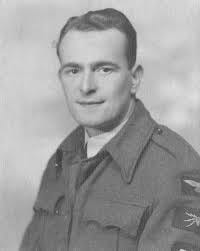My dad would have been 99 on February 25th. He lived to 95, and as my mother said once to me, " Your dad survived the Great Depression & World War Two, everything after that has been gravy to him."
I don't think it would have surprised him to have seen how much more the world has gone to shit since he died. What would have bothered him, however, was the callous disregard by politicians and the news media to death either of civilians who perished during this pandemic or those that will die because the pandemic is not over yet, no matter how much the 1% want us back out shopping and consuming.
If he were alive what would have scared my dad shitless were the drums of war beaten today by the press and politicians of all stripes over Ukraine. Even Keir Starmer can't help but join the tub thump for NATO. I guess it was inevitable because much of Britain during Covid fell down that rabbit hole where they believed Captain Tom represented the spirit and gumption of the World War Two Generation. The reality is most who fought in the Second World War were working class who did their fighting and dying as lowly soldiers. My dad was one of those working-class defenders of Britain during World War Two. Below is what it felt like for him to turn eighteen in 1941 when the outcome of the war against Hitler was far from certain.
When my birthday arrived on Feb 25, 1941, it was a quiet affair because Roy had already left to join the Cold Stream Guards. I Didn't want to spend it with anyone because I was both scared and excited for what lay ahead for me in the RAF.
Instead of a piss up, I indulged myself with a visit to the public baths located at the bottom of Boothtown Road. When I arrived I paid an attendant 5p and was presented with a sliver of soap and a towel. A female attendant led me along a narrow passageway until she found a room with an unoccupied tub. Inside, the attendant placed a plug into the bath. She turned the taps on and filled the bath with warm water until it reached a level marked on its side. After she was done, she left and closed the door behind her. I undressed and stepped into the bath. It felt wonderous to soak in a warm bath rather than a tin tub filled with tepid water in my mother’s scullery. I was empty of thoughts or cares until the water grew cold, and it was time to dry myself, dress, and depart.
Afterwards, I met my sister Alberta in a pub. She had come down to Halifax, from Bradford, to bid me farewell. She was having her own rough go because her husband had down a bunk from the army after his experiences in Dunkirk made him conclude dying for King and country wasn't what it was all cracked up to be.
Alberta and I sipped our beer and looked into each other’s faces. I guess we wanted to see if we could read our shared doss house past upon them.
We shared some laughs but more silences. It wasn't painful to be silent in Alberta's company because we both knew we loved each other and no words could describe or define what we had experienced as children during the great hunger of the 1930s. When it was time for my sister to leave, she got up, kissed me on the cheek and said.
“Come back safe, Harry. ”
I awoke the next day with a jittery feeling like it was the first day of a new school year. I dressed warmly and went to the kitchen. My mother was sitting alone, warming herself by the oven. Bill had already gone to work, and my half-brothers were at school. She made me a cup of tea and cut me a large slice of fresh bread. There was a generous lather of butter and jam on it.
“Go on, tuck in."
"Keep your head down, Harry and don’t do anything daft because life is short, my boy; life is short.”
I hugged her with mixed emotions. I mumbled farewell, picked up my cardboard suitcase that was fastened together with coarse string, and made my way to the train station. I was on my way to Padgate for RAF induction.
It was cold, damp, and grey; sweet smoke from the McIntosh toffee plant fell like drizzle across the station. I reached into my overcoat and found a near-empty packet of cigarettes.
I placed one in my mouth and furiously struck a match and quickly inhaled the harsh tobacco. In the distance, I heard the whistle of my train and smelled the coal burning off its engine. The smoke from the train was so dense, I could taste the soot in my mouth, around my teeth, and on my tongue. It was a reminder of where and what I came from. I was the son of a collier, and all my ancestors had worked the coal face beneath the ground since my family's memories began.
As the train drew its way into the belly of the station, another passenger approached the platform. He was a man in his fifties, long past his time for war, and he was whistling the tune, Run rabbit, run rabbit, run, run, run…"




Your father was an outstanding man, husband and American citizen from your description of him here. He lived a long life when times in America were much better than they are today.
BTW, my birthday if 02/27. Your father and I were spirit brothers. 💪😇